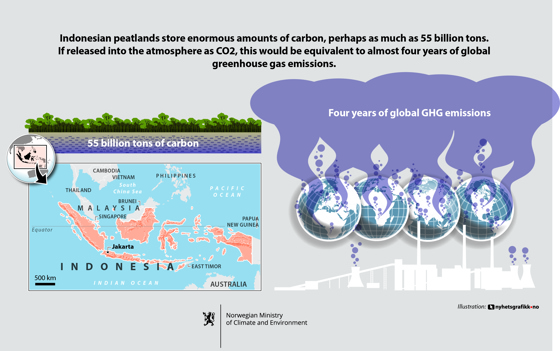Press release: - Indonesia's Peat Moratorium could benefit people, welfare and climate
Historical archive
Published under: Solberg's Government
Publisher: Ministry of Climate and Environment
News story | Date: 05/12/2016
Indonesia's President Jokowi today issued a moratorium on the conversion of peatland. According to the government regulation issuing the moratorium, activities that degrade the hydrological functions of peat are illegal. The moratorium could – if properly monitored and enforced – contribute greatly to future fire prevention and significantly reduce Indonesia's greenhouse gas emissions. It could also help restore the parts of the Indonesian economy that was badly hurt by last year's peat fires.
“We commend the leadership of President Jokowi in establishing this moratorium. It could have tremendous benefits for the Indonesian people and their health, welfare, and environment. This could also prove to be a breakthrough for the implementation of the Paris Agreement, as one of the biggest commitments of any single country to save the global climate since the climate summit in Paris last year”, says Vidar Helgesen, Norway's Minister for Climate and Environment.
Indonesia and Norway have since 2010 worked in partnership to support Indonesia's commitment to reduce emissions from forest and peat. In 2011, Indonesia introduced a moratorium on new conversions of primary forest and peat below 3 meters deep. Indonesia has renewed this ban several times since then and it is still valid. The moratorium announced today goes further as it covers all peat, is legally binding and instructs companies to restore peatlands in areas where these have been degraded.
As a consequence of the new peat moratorium being legally recognized through President Widodo’s signature, Minister Helgesen announced today that Norway will contribute 25 million USD to help restore Indonesia's peatland. Norway will disburse an additional 25 million USD once the monitoring and enforcement plan for the new peat moratorium is ready. Indonesia will work to restore degraded peatland, reduce susceptibility of peatland to fires and improve livelihoods of rural communities’ dependent on peatland environments. Preventing fires and haze will significantly reduce Indonesia's greenhouse gas emissions, and protect public health.
"Stopping the conversion of peatland in Indonesia is a huge win in the fight against climate change", said Andrew Steer, President & CEO, World Resources Institute. "Indonesia’s leaders have a unique opportunity to slow the country’s emissions from the conservation and restoration of peatland. Indonesia is demonstrating real leadership, delivering sustainable economic growth, while advancing innovative ways to rein in its emissions.”
In 2015, severe forest and peat fires raged across Indonesia. In the most intense fire period, the fires released more greenhouse gas emissions than the entire US economy on the same days. The fires caused a significant loss to the Indonesian economy in 2015 as enormous resources had to be put in by the government to protect people, infrastructure and biodiversity from the fires.
Since then, Indonesia has undertaken several measures to combat future fires. With an initial funding support from Norway, key government institutions like the Ministry of Environment and Forestry, the Ministry of Agriculture, the Peatland Restoration Agency (BRG) and the Geospatial Information Agency (BIG) – with technical support from Universitas Gadja Mada (UGM) and the World Resources Institute (WRI) – Indonesia has kick-started a massive mapping exercise to be able to prioritize protection of high value areas and support restoration.
Facts about Indonesian Peatlands
Indonesia's peatlands occupies more than 15 million hectares of land, mainly on the islands of Sumatra, Kalimantan, and Papua – an area more than twice the size of Ireland. These peatlands store enormous amounts of carbon. The peat reaches from 50cm – 10 m below ground and releases large amounts of carbon dioxide (CO2) to the atmosphere when it burns. One of the main reasons for peatland degradation and destruction is that peat is drained to be used for cultivation of agricultural crops such as palm oil. More than 60 percent of Indonesia’s emissions come from deforestation and the degradation of peatlands, including peat fires.

Estimates of the Potential climate benefits of the new moratorium policy in Indonesia:
We do not yet have complete data on peatlands and their ability to store carbon. The World Resources Institute (WRI) have reviewed available data, including from the Global Forest Watch portal, and has made the following preliminary estimates, based on data from the two most peat rich islands in Indonesia; Sumatera and Kalimantan.
According to WRI estimates, the potential climate benefits (avoided emissions and removals measured in units of metric tons of CO2) that could result from the new peatlands moratorium in Indonesia are as follows:
- Over a 15-year period (2016-2030), total climate benefits could be approximately 5.5 - 7.8 Gt CO2, depending on whether or not the hydrology of peat within existing plantations is restored. This range is equivalent to roughly all the greenhouse gases emitted in a year by the United States.
- These estimates include (1) avoided CO2 emissions resulting from stopping business-as-usual expansion of plantations on peatlands; (2) CO2 removals (sequestration) resulting from the conservation of these areas (vs. conversion under business-as usual); and (3) avoided emissions that could result from restoring the hydrology of peat within existing plantation areas.